Featured
Weibo Watch: Walking on Eggshells
In today’s Chinese social media environment, both foreign brands and local influencers must tread carefully, as even minor missteps can trigger significant consequences.
Published
10 months agoon
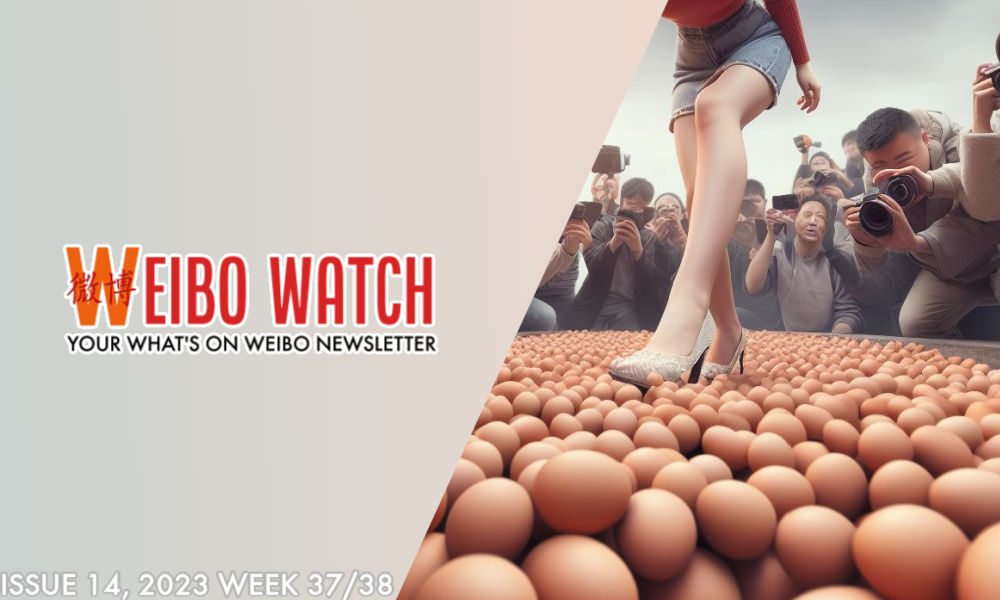
PREMIUM NEWSLETTER | ISSUE #14
This week’s newsletter:
◼︎ 1. Editor’s Note – Walking on eggshells
◼︎ 2. What’s Trending – A closer look at the featured stories
◼︎ 3. What More to Know – Highlighting 8 hot topics
◼︎ 4. What Lies Behind – Dr. Pieke on China’s influence and interference
◼︎ 5. What’s Noteworthy – No consent to marry
◼︎ 6. What’s Popular – ‘Secret Agent Missions’
◼︎ 7. What’s Memorable – Meng Wanzhou back to the Motherland
◼︎ 8. Weibo Word of the Week – “Floracash”
Dear Reader,
Tears and apologies don’t seem to mean much in today’s social media era.
Not too long ago, a well-known Chinese female university professor known as ‘Xiangyi’ (相宜) posted an emotional video addressing an issue that happened some time ago. The professor, who previously became an internet celebrity with millions of followers, vanished from the public eye in 2022 due to criticism for her use of the phrase “our Japan” (“我们日本”) during a livestream when discussing Japanese authors and their works.
Xiangyi said “our Japan” three times and it sparked backlash, as viewers interpreted it as a sign of her loyalty to Japan over China. In her tearful video, she explained that it was merely a figure of speech (“口头语”), akin to saying, “This is our Teacher Zhang,” when introducing someone; “He is one of our Japanese authors.” While her choice of words did reflect her affection for the authors, it wasn’t necessarily an indicator of her greater commitment to Japan over China.
However, the consequences for Xiangyi were severe. She felt compelled to resign from her university position due to ongoing online harassment and “malicious reports.”
Xiangyi’s tearful video failed to garner sympathy from netizens, mirroring the response to ‘Lipstick King’ Li Jiaqi’s recent apology video for controversial comments made during a live stream. Both were dismissed as insincere and too little, too late.
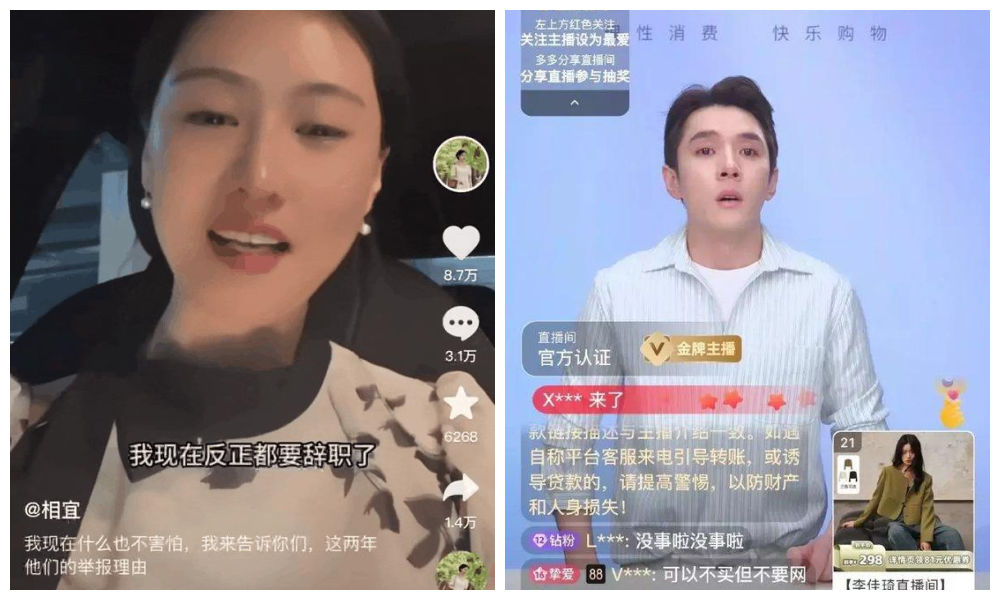
In their recent videos, ‘teacher influencer’ and ‘beauty influencer’ Xiangyi and Li Jiaqi both cried and showed remorse over the controversy triggered by their livestreams.
Another recent social media controversy revolved around a photo on Apple’s Chinese-language webpage. It featured an Asian-looking individual with braided hair, leading some Chinese netizens to claim it insulted China. They believed the hairstyle resembled a queue, worn by male subjects during the Qing dynasty, and that Apple had deliberately and inappropriately used such an image to show Chinese individuals as being backward and unattractive.
It has since become evident that many assumptions about the image were unfounded. Contrary to the initial belief that the photo was exclusive to the Chinese page, the image appeared on Apple’s websites in multiple countries and featured a California-based Native American female employee, not of Chinese descent.
Nevertheless, many internet users and bloggers insisted that brands operating in China should pay more attention to the cultural context they operate in to avoid offending consumers. Although some also acknowledged the controversy was “excessive” or “overly sensitive,” a seeming majority still stood by their initial reaction to the photo.
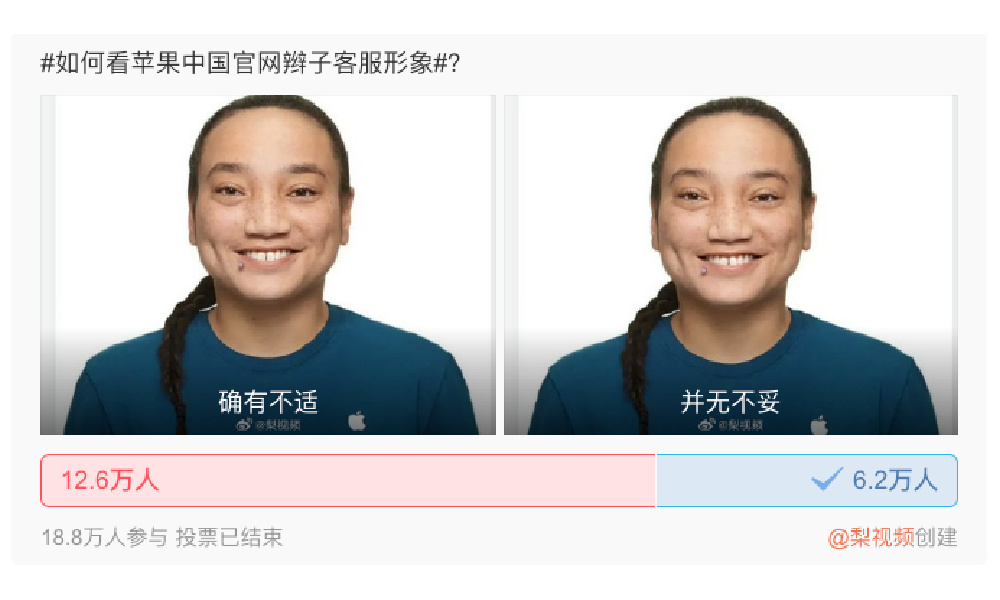
This Weibo poll shows the image that caused controversy recently, with a majority of respondents suggesting this photo is “inappropriate.”
In recent years, many incidents that unfolded on Chinese social media, either in livestreams, online advertisements, or Weibo posts, have demonstrated that minor missteps can cause social media storms. One wrongly chosen word, image, or outfit can start an almost unstoppable wave of criticism that can end careers, close doors, and terminate accounts.
But what happens once livestreamers, celebrities, and brands have to watch their every single move? How does constant scrutiny affect creativity, humor, and authenticity? When the fear of causing offense becomes a threat to one’s reputation and livelihood, can open discussions still thrive? Are there still any images, advertisements, livestream channels or websites immune to controversy?
This discussion echoes debates seen on Western social media, where so-called ‘wokeness’ has become so divisive that it is harming support for the very issues it aims to be highlighting while ‘cancel culture’ can have detrimental impact on anyone whose opinions stir controversy.
In the Chinese context, social media has become an even greater pressure cooker for brands, influencers, and celebrities. Besides taking into account the legal limits of what they can say or do online, they must also navigate a labyrinth of unwritten rules, including those promoting moral and cultural values, projecting positivity and patriotism, all while delicately considering geopolitical and economic sensitivities.
Lately, some people have speculated that Li Jiaqi’s outburst during his livestream might have been a result of burnout and mental health issues stemming from years of striving to please various stakeholders, including audiences, companies, sponsors, platforms, and the media. It might be one of the most plausible observations about the situation. Regardless of the allure of money and fame, being an online influencer under constant public scrutiny on Chinese social media seems like an utterly exhausting job to have.
Best,
Manya (@manyapan)
What’s Trending

1: Cross-Generational Living | Chinese nursing homes are changing their image in the social media age. While Chinese vloggers experiment with living in old people’s homes, and nursing homes are modernizing their facilities, some senior care centers are offering young people the chance to reside in their communities for free – as long as they spend some time with their elderly residents.

2: Bad Apples? | There is a lot of Apple anger on Chinese social media this week. Two separate trending topics have ignited discussions. One revolves around Chinese actor Liu Jin, who smashed his iPhone 13 Pro Max in front of the Apple flagship store, while another one centers on an image of an Apple employee deemed inappropriate by Chinese netizens. But both viral trends have unfolded with surprisingly ‘juicy’ twists.

3: The Lipstick King Controversy | Li Jiaqi, also known as Austin Li the ‘Lipstick King,’ has become the focus of intense media attention in China over the two weeks. The controversy began when the popular beauty influencer responded with apparent annoyance to a viewer’s comment about the high price of an eyebrow pencil. As a result, his fans began unfollowing him, netizens started scolding him, Chinese state criticized him, and the memes started flooding in. Why did this case blow up? We explore three reasons.
What More to Know
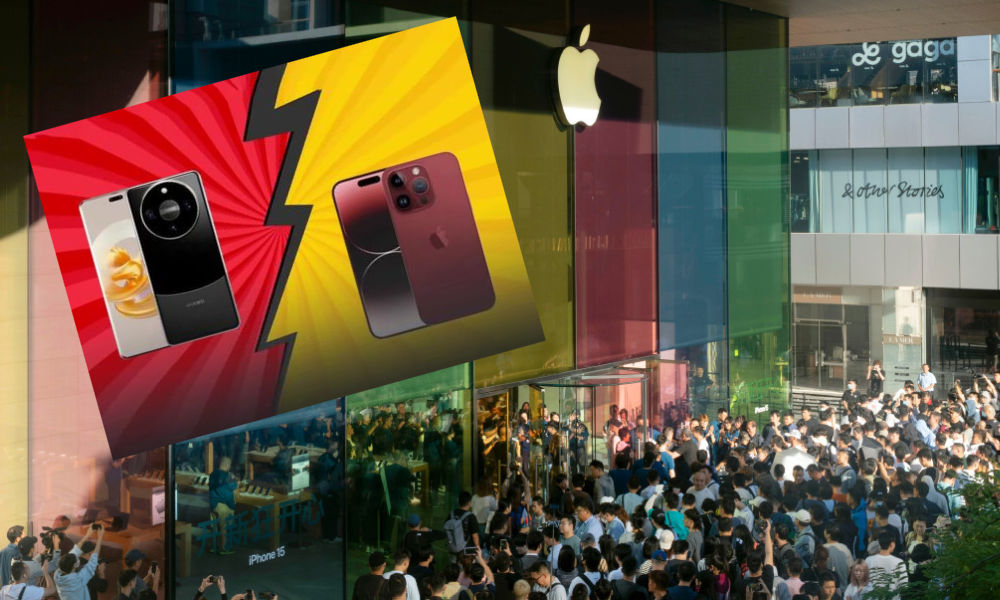
Background photo: Lining up for Apple’s Pro Series in Beijing while the Huawei vs iPhone rivalry is flaring up. Image via Sina News.
◼︎ 1. Panic over Prefab Meals. As the new school season has started, the word “yùzhìcài” (预制菜), ‘pre-fabricated meal,’ is all over Chinese social media this week. This is partly because of angry parents discovering that their children’s school cafeterias have transitioned from freshly prepared meals to ready-made ones. This is part of a broader trend in China that has risen over recent years, but there is significant resistance to this change due to concerns over the meals lacking nutrition, containing too many additives, and not being safe enough. The Chinese Ministry of Education has responded to the controversy by stating that they do not encourage the widespread adoption of pre-made meals in schools; there is currently no nationally established unified standard for ready-made meals, and the top priority should be the “nutrition and healthy development of children.” (Various hashtags on Weibo, such as “CNR Discusses How Ready-Made Meals Are entering the Campus” #央广网评预制菜进校园#, 110 million views).
◼︎ 2. PhD Student Suicide. The death of a PhD student at Northwestern Polytechnical University (西北工业大学) in Xi’an became a major topic on Chinese social media this week. The male student, who majored in material science, faced challenges in both his studies and mental well-being. In the period before he jumped to his death, the man had exhibited unusual behavior and voiced concerns about others accessing his phone and computer. His death sparked conversations about the pressures faced by PhD students in China, particularly in STEM fields, and the concerning rate of depression among them. (Hashtag “31-Year-Old PhD Student Dies after Jumping Off Dorm Building” #31岁博士生宿舍楼坠楼身亡#, 160 million views).
◼︎ 3. Body Parts Found in Shijiazhuang. In a residential community in the Qiaoxi District of Shijiazhuang, neighbors were shocked when human body parts were found scattered around a residential building. Initially, fears of a homicide case spread across Chinese social media. However, the official investigation into the incident has since determined that it was not a homicide but a possible suicide. The victim has been identified as a 28-year-old woman who collided with a second-floor balcony during her fall from the building, resulting in the separation of her limbs. Foul play has now been ruled out. (Hashtag “Shijiazhuang Neighborhood: Remains of Human Body Suspected to Be Female” #石家庄某小区尸体残肢疑为女性#, 100 million views).
◼︎ 4. Uniqlo Incident. An incident that happened at a Uniqlo store in Xining on September 18 became a big topic of discussion. A female customer who was suspected of not paying for her purchases was physically restrained by two staff members who grabbed her by the neck and dragged her to the checkout counter. The incident quickly gained the attention of netizens after an eye-witness shared a video of the female customer breaking down in tears at the store. It later turned out that the customer had actually paid for all of her items, and the store staff was condemned for their violent behavior. The Uniqlo store in question was temporarily closed in light of the incident. (Hashtag: Female Customer Grabbed by Uniqlo Staff, Dragged Back to Checkout Counter” #女顾客被优衣库工作人员掐脖子拖回收银台#, 220 million views).
◼︎ 5. Bao’an Dies after Working in Hot Room The recent death of a 48-year-old security guard (commonly called ‘bao’an‘ 保安 in Chinese) has stirred significant online discussions after details surrounding the man’s death were exposed by his relatives. The man. Mr. Zhao, died a sudden death in his dormitory at night after another day working in the very hot security room where he spent most of his days. His wife later claimed the man worked 12-hour long shifts and had not had a day off for 190 days straight. On average, he worked 360 hours per month at the company, where he had worked for 14 years. His workplace, a cramped 10-square-meter room, was exposed to direct sunlight. During July and August, when the indoor temperature at his workplace exceeded 40°C (104°F), the man’s employer provided nothing but an electric fan to cool the security room. The family believes that the company seriously violated national laws, neglected the lives of its employees, and eventually led to Mr. Zhao’s “death by overwork” while being exposed to extreme temperatures. (Hashtag: “Bao’an Who Died in Hot Dorm Previously Complained about Heat in Room on Wechat Moments Four Times” #保安宿舍猝死曾4次发朋友圈称执勤室好热#, 260 million views).
◼︎ 6. iPhone 15 versus Huawei Mate 60. The rivalry between Apple and Huawei has been a trending topic lately, especially with Apple’s recent launch of the iPhone 15 shortly after Huawei introduced its latest flagship, the Mate 60 Pro 5G. While it’s evident which smartphone brand holds more favor in terms of nationalistic sentiments, criticism of Apple and its iPhone often appears to be more about words than actions. Thousands of Chinese consumers lined up for the latest iPhone model’s launch on Friday morning, and online sales saw a significant surge. (Hashtag “Do You Want the iPhone 15 or Huawei Mate 60?” #你要iphone15还是华为mate60#, 140 million views; “iPhone 15” #iphone15#, 710 million views).
◼︎ 7. Chinese Tourists: No Visa Needed for Thailand As of September 25, Chinese nationals can enter Thailand without a visa for a temporary stay of up to thirty days. This visa exemption, which will be in effect until February 29, was initiated by Prime Minister Srettha Thavisin as a measure to boost local tourism. It is expected to attract an additional 5 million tourists to Thailand. Many netizens on Weibo expressed their excitement and welcomed this news. Earlier this year, Thailand gained popularity for its warm reception of Chinese tourists in the post-pandemic travel era. Thai authorities not only waived the requirement for Covid tests or vaccination proof but also went the extra mile by having Cabinet ministers personally greet Chinese tourists at Bangkok’s airport with flowers and gifts. (Hashtag: “Thailand Implements 5-Month Visa-Free Policy for China” #泰国对中国实施5个月免签政策#, 110 million clicks).
◼︎ 8. Putin is Coming to China. Over the past two weeks, while social and societal topics have taken the spotlight on Weibo and Douyin trending lists, there have also been trending discussions related to geopolitical affairs, with a particular focus on Vladimir Putin. Firstly, this was due to Putin’s significant meeting with Kim Jong-un. Secondly, China’s top diplomat, Wang Yi, had a meeting with the Russian president in St. Petersburg this week. During their discussions, Putin confirmed his upcoming visit to Beijing in October for the Belt and Road Summit. This topic garnered significant attention, making headlines in multiple news outlets and ranking high in top trends on Baidu News. (Hashtags “Putin Meets Wang Yi #普京会见王毅#, 64 million views; “China Responds to Putin’s October Beijing Visit” #中方回应普京10月将访华#, 300k views).
What Lies Behind
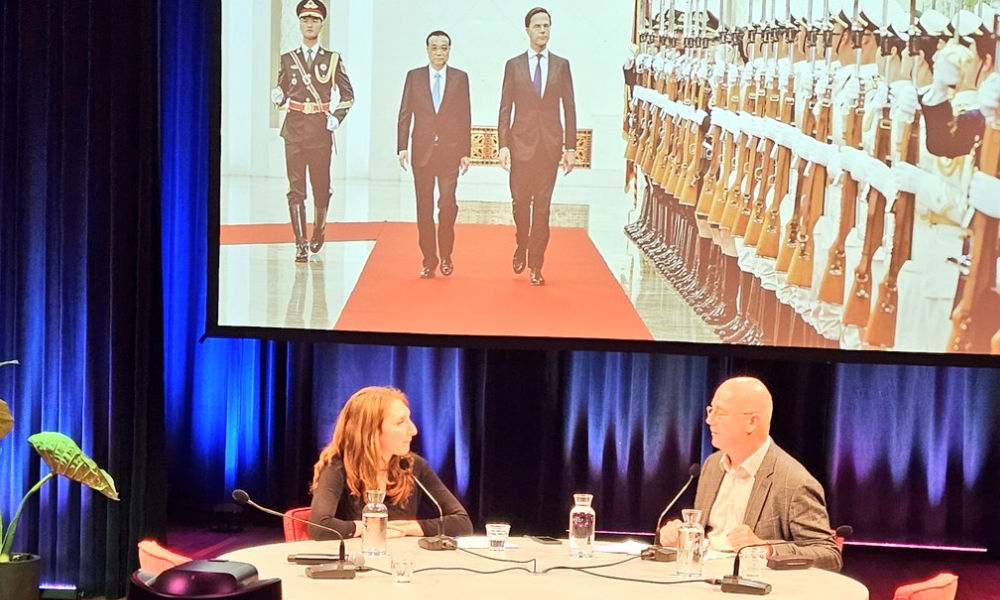
Dr. Pieke on China’s Influence and Interference
From suspicious balloons to new counter-espionage laws, there has been extensive discourse surrounding possible foreign interference in China over the past year. However, discussions about Chinese influence in foreign countries are equally lively, if not more intense.
Earlier this week, Amsterdam’s De Balie discussion center hosted an event dedicated to Chinese influence in Europe, with a particular focus on the Netherlands. At the core of this discussion was Professor Frank Pieke’s research (formerly of the University of Oxford and MERICS Berlin, now at Leiden University) on the influence and interference of the People’s Republic of China among the Chinese population in the Netherlands. This research was conducted on behalf of the Ministries of Justice and Security, Foreign Affairs, and Defense.
During the event, Pieke offered valuable insights and urged the audience to approach discussions about China’s political influence on other countries with greater nuance. Pieke argued that, both in the Dutch context and elsewhere, reactions to China are increasingly based on stereotypes or preconceived notions rather than the actual situation. Over the years, political institutions in the West and journalism have become more biased toward China, a trend that Pieke finds concerning.
This bias and preconception have a twofold impact. Firstly, it hampers relations with China, which are mutually beneficial in many ways. Secondly, it blinds us to the real concerns that Europe and other Western countries should have.
Pieke pointed out, “Nowadays, there is a tendency in ongoing debates to lump together all forms of contact with China and categorize it as ‘Chinese interference,’ whether it’s a friendly conversation over a cup of coffee, a briefing by the Chinese embassy, espionage activities by Chinese companies, or the way the Chinese government tries to influence people. This is something I continually caution against.”
Pieke emphasized the need to encourage extensive contact with China, as there are numerous forms of Sino-Dutch and Sino-foreign relations that are not only harmless but also desirable and fruitful. However, Pieke cautioned that certain trends and developments have the potential to be harmful, and Dutch authorities should pay special attention to these.
As long as we maintain bias and categorize all forms of contact with China together, the process of addressing these specific issues becomes nearly impossible. This simplistic portrayal of everything related to China or the Party as bad, evil, or unwanted hinders constructive dialogue and effective policy-making.
Meanwhile, Pieke found that while the Communist Party does indeed exert influence over Chinese organizations and media abroad, this influence is used sparingly in practice. In essence, there is relatively little direct interference; they have the potential for it but do not extensively employ it in Dutch society.
A significant finding from Pieke’s research is that Chinese individuals living in Holland either do not perceive this influence or hold limited opinions about it. What can be observed though, is that Chinese in the Netherlands adjust their behavior based on what they believe may be viewed as ‘desirable’ or ‘undesirable’ by both the Chinese government and other Chinese individuals in their overseas communities. Pieke labels this as a form of “soft power” or “soft threat,” distinct from self-censorship. The primary control of this ‘influence’ predominantly rests with overseas Chinese themselves.
What’s Noteworthy
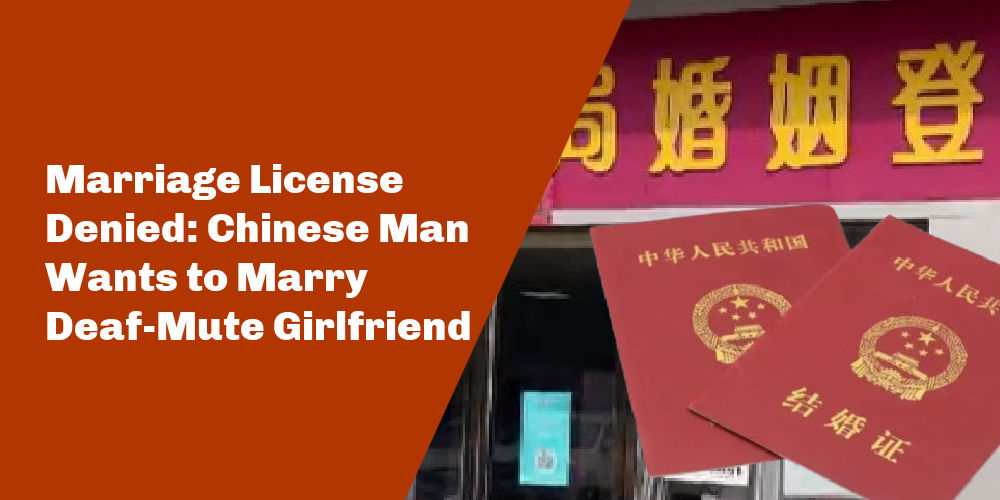
No Consent Given | A man from Gongyi, Zhengzhou, Henan, recently became a trending topic on Chinese social media due to the denial of his marriage license application with his girlfriend, who is deaf and mute. According to Chinese media reports, both sets of parents had consented to the marriage, and the couple had already taken their wedding photos. However, the local Bureau of Civil Affairs rejected their application, citing the requirement for both parties to independently declare their intention to marry. The woman, who had never attended a school for the Deaf, lacked the ability to use sign language, write, or communicate effectively. The Bureau advised the couple to return once she had completed her education and could express her desire to marry.
As news of this incident circulated on Chinese social media, many people praised the “responsible decision” of the local Bureau of Civil Affairs. Last year, one human trafficking case gained national prominence after a TikTok vlogger exposed the horrific living conditions of a woman in Xuzhou who appeared to be unable to communicate. She was married with eight children and kept in a shed next to the house, tied to a chain. It later turned out that local officials made errors in properly checking and verifying when approving the marriage certificate. Read more about the Xuzhou woman case here.
What’s Popular
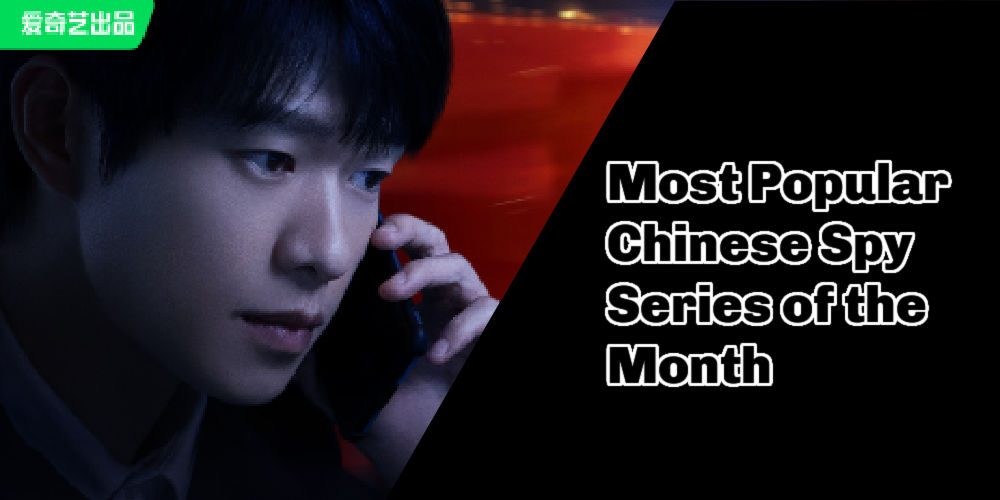
Secret Agent Missions | While espionage and foreign influence is a popular topic in Chinese media and foreign policy, they are also recurring themes in popular culture. Throughout the years, China has produced numerous TV series centered around espionage. The latest Chinese sensation in this genre is Spy Game (特工任务), which delves into the challenging work of Chinese national security in countering foreign spy activities and safeguarding the nation’s security.
One of the main characters in the series is Huang Zicheng (黄子诚), portrayed by Chinese actor Wei Daxun (魏大勋). Huang inadvertently becomes entangled in spy-related affairs and ultimately becomes an informant for the National Security Bureau. However, as he operates within a web of conspiracies and foreign influence, he struggles to see who he can trust or what is real.
With millions of viewers tuning in to this hit series since its premiere on September 20, the hashtag #Huang Zicheng Admits Involvement in Spy Activities” (#黄子诚涉及间谍行为提出自首#) went trending on Chinese social media this week, attracting a staggering 430 million views.
If you’d like to tune into this series, it’s available on iQiyi and also on YouTube with English subtitles. You can start with the first episode here. (They just released the fifth episode last night).
What’s Memorable
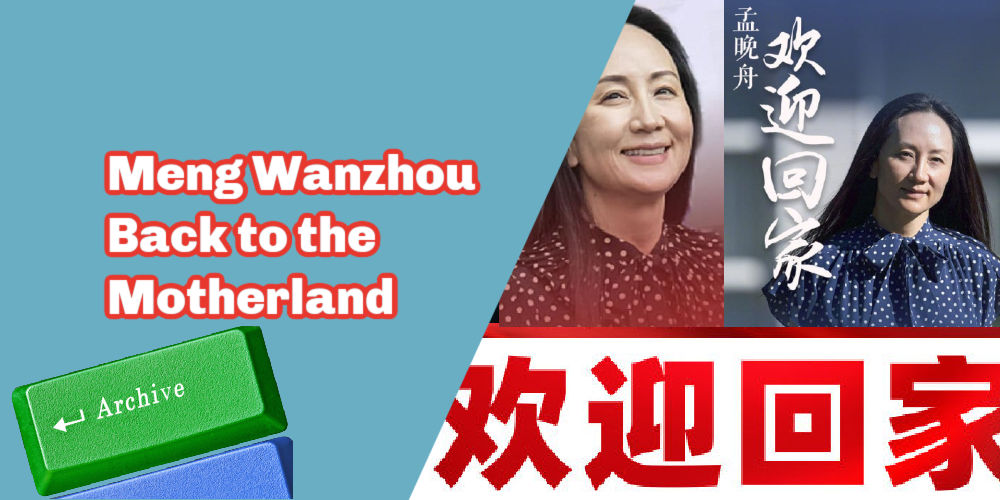
Huawei’s Daughter | In this time of Apple-Huawei rivalry, it is clear that the ongoing tech giant competition in China is about much more than smartphones alone and has come to symbolize geopolitical rivalry, encompassing themes of nationalism, anti-Western sentiments, and a growing sense of pride in products made in China. In this context, it is perhaps not surprising that Huawei decided to let its launch ceremony coincide with the second anniversary of Huawei executive Meng Wanzhou’s return to China from house arrest in Canada back in 2023 (September 25).
In this throwback from our archives, you can read more about Meng Wanzhou’s (孟晚舟) homecoming to China. It had been almost three years since the Chief Financial Officer (CFO) of Huawei and the daughter of Huawei founder Ren Zhengfei was initially detained in Canada during a layover at Vancouver airport at the request of U.S. officials. In 2019, we reported on how the Meng Wanzhou case sparked anti-American and pro-Huawei sentiments on Weibo (link). By linking its highly-anticipated launch ceremony to Meng’s return, Huawei is further emphasizing its role as a major player in the geopolitical rivalry landscape.
Weibo Word of the Week
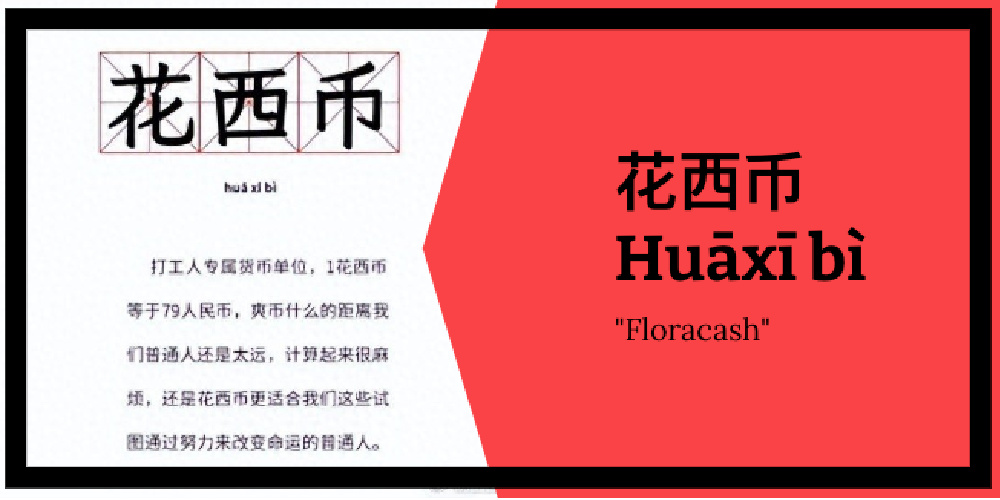
“Huaxi Coins” | Our Weibo Word of the Week is “花西币” (Huāxī bì), which translates to “Huaxi coins” or “Floracash.”
By now, you’re probably aware of all the controversy surrounding China’s most famous beauty influencer Li Jiaqi that followed a livestream he did to promote the Chinese make-up brand Florasis, which is known as Huāxīzǐ (花西子) in China.
After some viewers questioned whether a single eyebrow pencil costing 79 yuan ($11) was too expensive, Li lashed out and suggested viewers should instead ask themselves if they worked hard enough to deserve a raise.
The incident sparked a series of memes and discussions, and among them the question of what one can buy with 79 yuan in China today was a big one. While some suggested they could feed an entire family for one day with that money, others said that it would buy their office lunches for a week.
This humorous situation gave rise to the term ‘Huaxi Coins’ or ‘Floracash,’ with netizens playfully using the eyebrow pencil’s price as a new currency unit, where one Huaxi Coin equals 79 yuan. People have even started jokingly expressing their earnings in Huaxi Coins, and some proudly mention the cost of snacks or meals, saying things like ‘it only cost me a quarter in Floracash for three’ or ‘tonight’s dinner was just half a Huaxi Coin!'”
This is an on-site version of the Weibo Watch newsletter by What’s on Weibo. Missed last week’s newsletter? Find it here. If you are already subscribed to What’s on Weibo but are not yet receiving this newsletter in your inbox, please contact us directly to let us know.
Manya Koetse is the founder and editor-in-chief of whatsonweibo.com. She is a writer, public speaker, and researcher (Sinologist, MPhil) on social trends, digital developments, and new media in an ever-changing China, with a focus on Chinese society, pop culture, and gender issues. She shares her love for hotpot on hotpotambassador.com. Contact at manya@whatsonweibo.com, or follow on Twitter.

China Memes & Viral
“Bye Bye Biden”: Biden’s Many Nicknames in Chinese
Throughout the years, Biden has received many nicknames on Chinese social media.
Published
5 days agoon
July 22, 2024
Our Weibo phrase of the week is Bye Bye Biden (bài bài Bàidēng 拜拜拜登). As news of Biden dropping out of the presidential race went viral on Weibo early Monday local time, it’s time to reflect on some of the popular nicknames and phrases given to US President Joe Biden on Chinese social media.
🔹 Biden in Chinese: Bàidēng 拜登
Biden in Chinese is generally written pronounced and written as Bàidēng 拜登. Although the character 拜 (bài) means “to pay respect, to worship” and 登 (dēng) means “to ascend, to climb,” they’re used here primarily for their phonetic similarity. The characters chosen are neutral to avoid any negative implications in the official translation of Biden’s name.
Why are non-Chinese names translated into Chinese at all? With English and Chinese being vastly different languages with entirely different phonetics and scripts, most Chinese people find it difficult to pronounce a foreign name written in English. Writing foreign names in Chinese not only standardizes them but also makes pronunciation and memorization easier for Chinese speakers.
🔹 Bye Biden: Bài Bài Bàidēng 拜拜拜登
Because Biden is Bàidēng, and the Chinese for ‘bye bye’ is written as bài bài 拜拜, some netizens quickly created the wordplay “bài bài Bàidēng” 拜拜拜登 (“bye bye Biden”) upon hearing that Biden would not seek reelection. Try saying it out loud—it almost sounds like you’re stammering.
🔹 Old Joe: Lǎo Dēng Dēng 老登登
Another common farewell greeting to Biden seen online is “bài bài lǎo dēng dēng” 拜拜老登登, which sounds cute due to the repetition of sounds.
“Old Biden” or “lǎo dēng dēng” 老登登 is a common online nickname for Biden in Chinese. The reduplication of the 登 (dēng) makes it sound playful and affectionate, while the “old” prefix is commonly used when referring to someone older. It’s similar to calling someone “Old Joe” in English.
🔹 Biden Variations: 拜灯, 白等, 败蹬
Let’s look at some other ways Biden is nicknamed online:
Besides the official way of writing Biden with the 拜登 Bàidēng characters, there are also other variations:
拜灯: bài dēng
白等: bái děng
败蹬: bài dèng
These alternative ways of writing Biden’s name are not neutral. Although the first variation is not necessarily negative (using the formal Biden 拜 bài character but with ‘Light’ 灯 dēng instead of the other 登 ‘dēng’), the other two variations are usually used in more negative contexts.
In 白等 (bái děng), the first character 白 (bái) means “white,” which can evoke associations with old age due to white hair (白发). The character 等 (děng) means “to wait,” and the combination can imply being old and sluggish.
败蹬 (bài dèng) is typically used by netizens to reflect negative sentiments towards the American president. The characters separately mean 败 (bài): “to be defeated,” “to fail,” and 蹬 (dèng): “to step on,” “to kick.” This would never be used by official media and is also often used by netizens to circumvent censorship around a Biden-related topic.
🔹 Revive the Country Biden: Bài Zhènhuá 拜振华
Then there is 拜振华 Bài Zhènhuá: revive the country Biden
In recent years, Biden has come to be referred to with the Chinese nickname “Revive the Country Biden,” also translatable as ‘Thriving China Biden’. This nickname has circulated online since 2020 and matches one previously given to former President Trump, namely “Build the Country Trump” (Chuān Jiànguó 川建国).
The idea behind these humorous monikers is that both Trump and Biden are seen as benefitting China by doing a poor job in running the United States and dealing with China.
🔹 Sleepy King: Shuì wáng 睡王
Shuì wáng 睡王, Sleepy King, is another common nickname, similar to the English “Sleepy Joe.” During and after the 2020 American presidential elections, there were numerous discussions on Chinese social media about ‘Trump versus Biden.’ Many saw it as a contest between the ‘King of Knowing’ (懂王) and the ‘Sleepy King’ (睡王).
These nicknames were attributed to Trump, who frequently boasted about his unparalleled understanding of various matters, and Biden, who gained notoriety for being older and tired. Viral videos, some manipulated, showed him nodding off or seemingly disoriented. The name ‘Sleepy King’ then stuck.
🔹 Grandpa Biden: Bài Yéyé 拜爷爷
Throughout the years, Biden has also been nicknamed Bài yéyé 拜爷爷, “Grandpa Biden.” This is usually more affectionate, though it emphasizes his age—Trump is not much younger than Biden and is not nicknamed ‘Grandpa Trump.’
Another similar nickname is lǎo bái 老白, “Old White,” referring to Biden’s age and white hair. 白 (bái, white) can also be a surname in Chinese. This nickname makes it seem like Biden is an old, familiar friend.
On Weibo, many speculate that American Vice President Kamala Harris will be the new candidate for the Democrats, especially since she’s been endorsed by Biden. Many have little confidence that she can compete against Trump. Her Chinese name is Kǎmǎlā Hālǐsī 卡玛拉·哈里斯, commonly referred to as ‘Harris’ (Hālǐsī).
In light of the latest developments, some netizens jokingly write: “Bye bye Biden, Ha ha ha, Harris.” (Bài bài, Bàidēng. Hā hā hā, Hālǐsī 拜拜,拜登。 哈哈哈,哈里斯). With a new Democratic candidate entering the presidential race, we can expect a fresh batch of creative nicknames to join the mix on Chinese social media.
Want to read more? Also read: Why Trump has Two Different Names in Chinese.
By Manya Koetse
Spotted a mistake or want to add something? Please let us know in comments below or email us. First-time commenters, please be patient – we will have to manually approve your comment before it appears.
©2024 Whatsonweibo. All rights reserved. Do not reproduce our content without permission – you can contact us at info@whatsonweibo.com.
China Memes & Viral
Enjoying the ‘Sea’ in Beijing’s Ditan Park
This “seaview” spot in Beijing’s Ditan Park has become a new ‘check-in spot’ among Chinese Xiaohongshu users and influencers.
Published
2 weeks agoon
July 15, 2024
“‘The sea in Ditan Park’ is a perfect example of how Xiaohongshu netizens use their imagination to change the world,” a recent viral post on Weibo said (“地坛的海”完全可以入选《红薯人用想象力颠覆世界》的案例合集了”).
The post included screenshots of the Xiaohongshu app where users share their snaps of the supposed seaview in Beijing’s Ditan Park (地坛公园).
Ditan, the Temple of Earth Park, is one of the city’s biggest public parks with tree-lined paths and green gardens in Beijing, not too far from the Lama Temple in Dongcheng District, within the Second Ring Road.
On lifestyle and social media platform Xiaohongshu, users have recently been sharing tips on where and how to get the best seaview in the park, finding a moment of tranquility in the hustle and bustle of Beijing city life.

Post on Xiaohongshu to get the seaview in Ditan Park.
But there is something peculiar about this trend. There is no sea in Ditan Park, nor anywhere else in Beijing, for that matter, as the city is located inland.
The ‘seaview’ trend comes from the view of one of the park’s stone walls. In the late afternoon, somewhere around 16pm, when the sun is not too bright, the light creates an optical illusion from a certain viewpoint in the park, making the wall behind the bench look like water.

You do have to capture the right light at the right moment, or else the effect is non-existent.

Some photos taken at other times of the day clearly show the brick wall, which actually doesn’t look like a sea at all.

Although the ‘seaview in Ditan’ trend is popular among many Xiaohongshu users and influencers who flock to the spot to get that perfect picture, there are also some social media commenters who criticize the trend of netizens always looking for the next “check-in spot” (打卡点).
There are also other spots popular on social media that look like impressive areas but are actually just optical illusions. Here are some examples:


One Weibo user suggested that this trend is actually not about people appreciating the beauty around them, but more about chasing the next social media hype.

The Ditan seaview trend is not entirely new. In May of this year, Beijing government already published a post about the “sea” in Ditan becoming more popular among social media users who especially came to the park for the special spot.
The Beijing Tourism Bureau previously referred to the spot as “the sea at Ditan Park that even Shi Tiesheng didn’t discover” (#在地坛拍到了史铁生都没发现的海#).
Shi Tiesheng (1951–2010) is a famous Chinese author from Beijing whose most well-known work, “Me and Ditan,” reflects on his experiences and contemplations in Ditan Park. At the age of 21, Shi Tiesheng suffered a spinal cord injury that left him paralyzed from the waist down. Ditan Park became a place for him to ponder life, time, and nature. Despite the author’s deep connection with the park, he never described seeing a “sea” in the walls.

Shi Tiesheng in Ditan Park.
If you are visiting Ditan Park and would like to check out the ‘sea’ yourself in the late afternoon, there are guides on Xiaohongshu explaining the route to the viewpoint. But it should not be too difficult to find this summer—just follow the crowds.

By Manya Koetse and Ruixin Zhang
Spotted a mistake or want to add something? Please let us know in comments below or email us. First-time commenters, please be patient – we will have to manually approve your comment before it appears.
©2024 Whatsonweibo. All rights reserved. Do not reproduce our content without permission – you can contact us at info@whatsonweibo.com.
Popular Reads
-

 China Insight3 months ago
China Insight3 months agoThe Tragic Story of “Fat Cat”: How a Chinese Gamer’s Suicide Went Viral
-

 China Music4 months ago
China Music4 months agoThe Chinese Viral TikTok Song Explained (No, It’s Not About Samsung)
-

 China Digital10 months ago
China Digital10 months agoToo Sexy for Weibo? Online Discussions on the Concept of ‘Cābiān’
-

 China Arts & Entertainment12 months ago
China Arts & Entertainment12 months agoBehind 8 Billion Streams: Who is Dao Lang Cursing in the Chinese Hit Song ‘Luocha Kingdom’?






